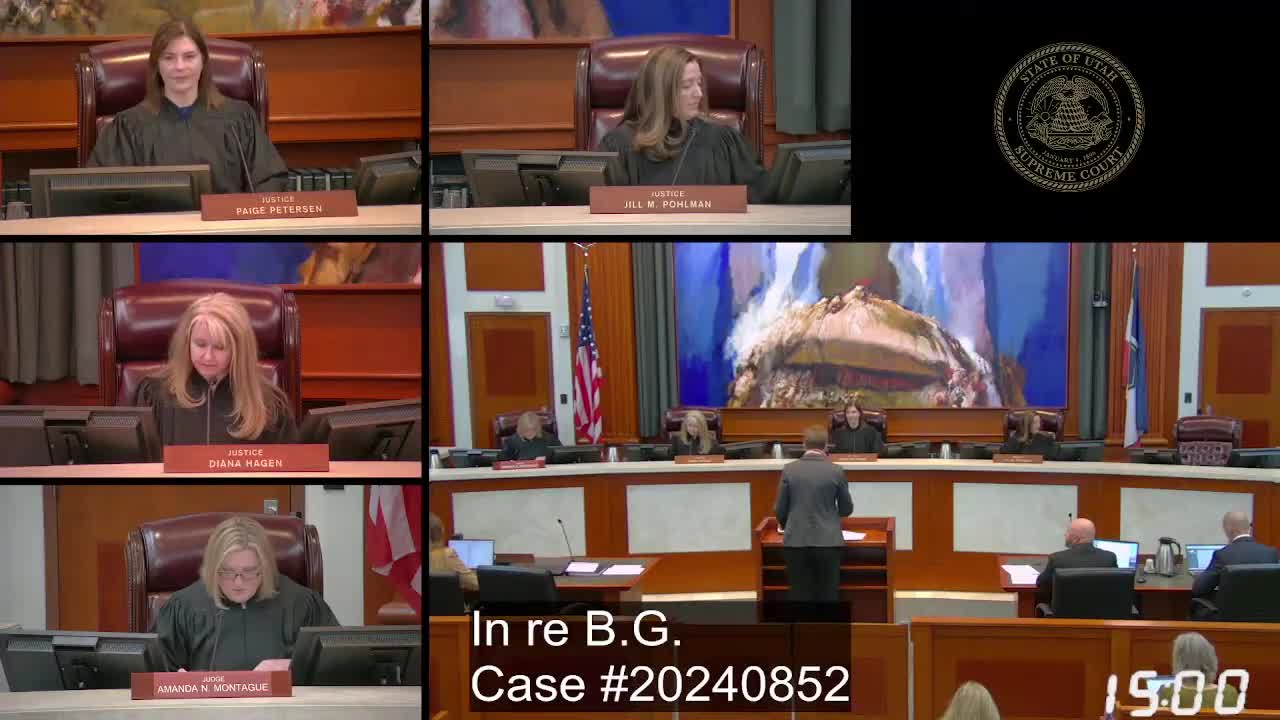Utah Supreme Court weighs whether interstate compact blocked father’s bid to regain custody
Get AI-powered insights, summaries, and transcripts
Subscribe
Summary
Appellate counsel for a father on appeal from a termination of parental rights argued before the Utah Supreme Court that trial counsel was constitutionally ineffective for failing to pursue a non‑ICPC alternative to a Georgia home study after ICPC requests were repeatedly denied while the father lacked stable housing.
Appellate counsel for a father whose parental rights were later terminated urged the Utah Supreme Court Wednesday that trial counsel was constitutionally ineffective when he did not seek an alternative to the Interstate Compact on the Placement of Children (ICPC) after ICPC requests were denied while the father lacked stable housing.
"So under the plain language of the ICPC, it does not apply to biological parents," counsel told the court, arguing that the ICPC regulates nonparental placements and that Utah’s shelter‑hearing statute, not the ICPC, should govern placements with biological parents.
The argument focused on two linked questions: (1) whether the ICPC applies to a biological parent who lives out of state, and (2) whether counsel’s failure to ask for a non‑ICPC alternative — such as a Regulation 3 courtesy check or a sending‑state site visit — prejudiced the father under the Strickland ineffective‑assistance framework.
Counsel recited the record: two ICPC requests in April and June 2023 were not completed because the father, at times, lacked a permanent residence and told caseworkers he was moving; in an October 2023 hearing the record reflects the father was living in a hotel; in January 2024 counsel asked for an expedited ICPC but the juvenile court declined; the termination petition was filed in December (as reflected in the record). Counsel said a short, targeted courtesy check would have satisfied the shelter‑statute requirement that the court "order the division to visit the parent's home" and that the ICPC's home‑study requirements (background checks of all adults, interviews, financial reviews and space assessments) go beyond what the shelter statute requires.
Assistant Attorney General John Peterson, appearing for the State, told the court the central factual problem was that "no one was ever able to pin him down and say, yeah, this is, this is, even as of, I think counsel said that counsel was…" — a point the State used to argue that no timely non‑ICPC visit occurred and that the ICPC denials reflected receiving‑state concerns about housing stability. Peterson noted a transcript entry from the October 25, 2023 hearing stating that "the State of Georgia denied the ICPC as the home study could not be completed because the father [did] not hav[e] a stable residence."
The guardian ad litem for the child, Keith Achi, told the Court the appeal should be read narrowly. He emphasized that the father had been adjudicated (dependency) earlier in the proceeding, that the juvenile court previously ordered an ICPC as the method to evaluate out‑of‑state placement, and that law‑of‑the‑case considerations and a split of authority made counsel’s chosen course defensible. Achi warned that declaring the ICPC inapplicable to biological parents could create practical difficulties for interstate placements and for benefit or service eligibility in receiving states.
Several justices pressed parties on statutory scope and practical consequences. The Court explored whether the shelter‑hearing statute's minimum requirements (a visit, a criminal‑history check, a review of management information) would have been satisfied by a courtesy check, and how the ICPC’s more extensive home studies differ because the receiving state makes an independent, non‑reviewable determination about suitability. Justices also asked whether the prejudice inquiry under Strickland should be adapted in child‑welfare termination cases, where the child’s best interests are central and proceedings may develop additional facts after the alleged ineffective performance.
Appellate counsel urged the Court to decide whether the ICPC applies to biological parents, saying the circuit split and the stakes for parental rights made resolving the statutory question appropriate. Counsel also argued courts should not defer to ICPC administrative interpretations (citing Hughes General Contractors and recent U.S. Supreme Court guidance on agency deference), and proposed remand to the juvenile court so a fuller record could be developed on the effect of the ICPC delay and whether a non‑ICPC check would have led to placement.
The State maintained that the record shows multiple instances where ICPC efforts failed or were delayed because of housing instability and that the practical concerns the ICPC addresses — protecting receiving states and ensuring children are placed in safe, sustainable settings — were implicated here. The State pointed to the possible disruption of sibling placements and the time children had already spent in foster care as factors that weighed against a late remedy.
After supplemental questioning about record specifics (including testimony about the father’s stays in a hotel and later in a home identified as the "Hunter Road" residence), the Court took the case under advisement.
Outcome and procedural posture: the appeal challenges the termination order in which the juvenile court relied in part on lack of an ICPC home‑study and on findings related to parental absence; the Supreme Court heard argument on whether trial counsel's performance was objectively deficient and whether any deficiency was prejudicial when measured against the record at the time counsel could have acted. The Court has not announced a decision.
